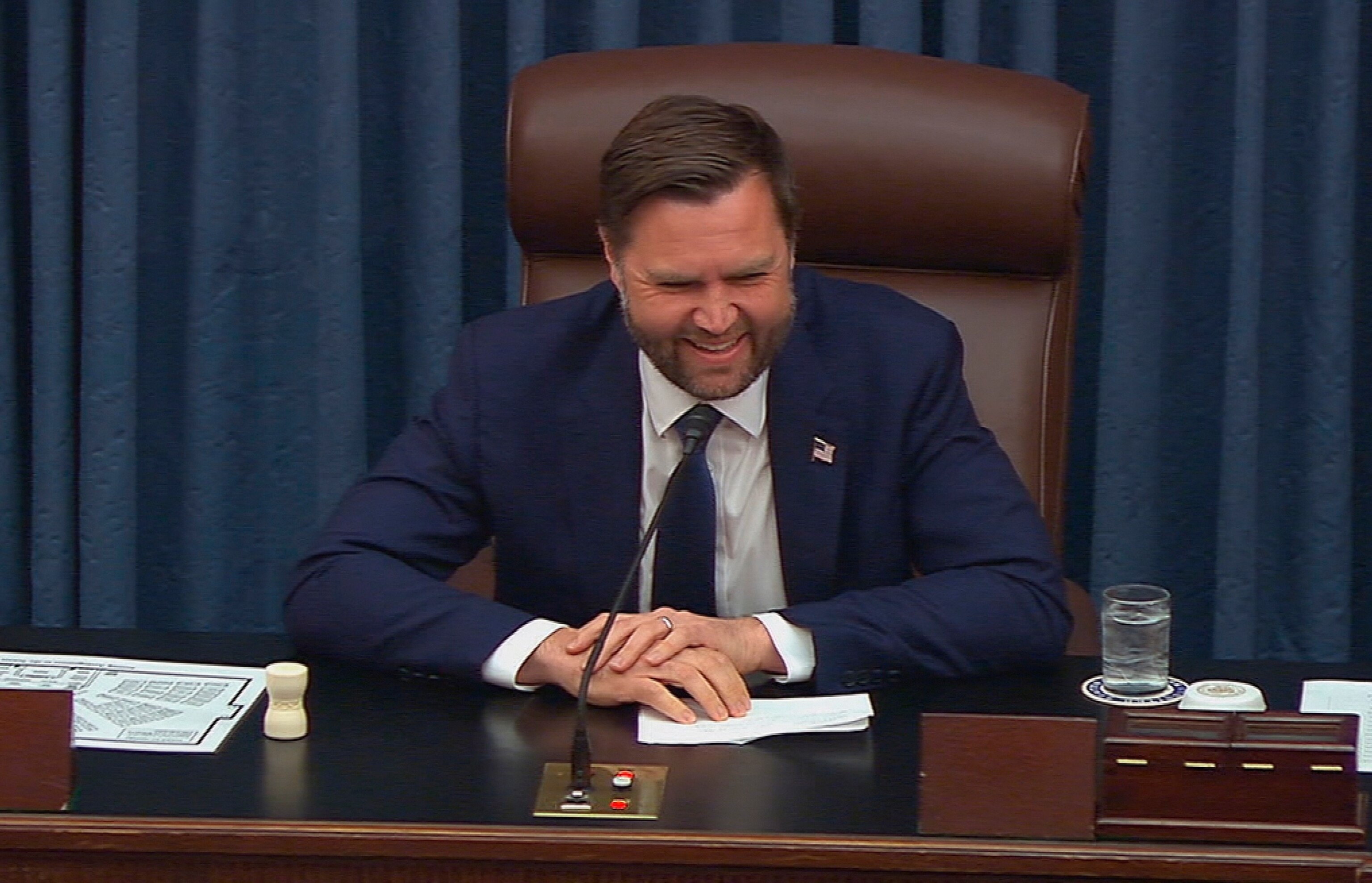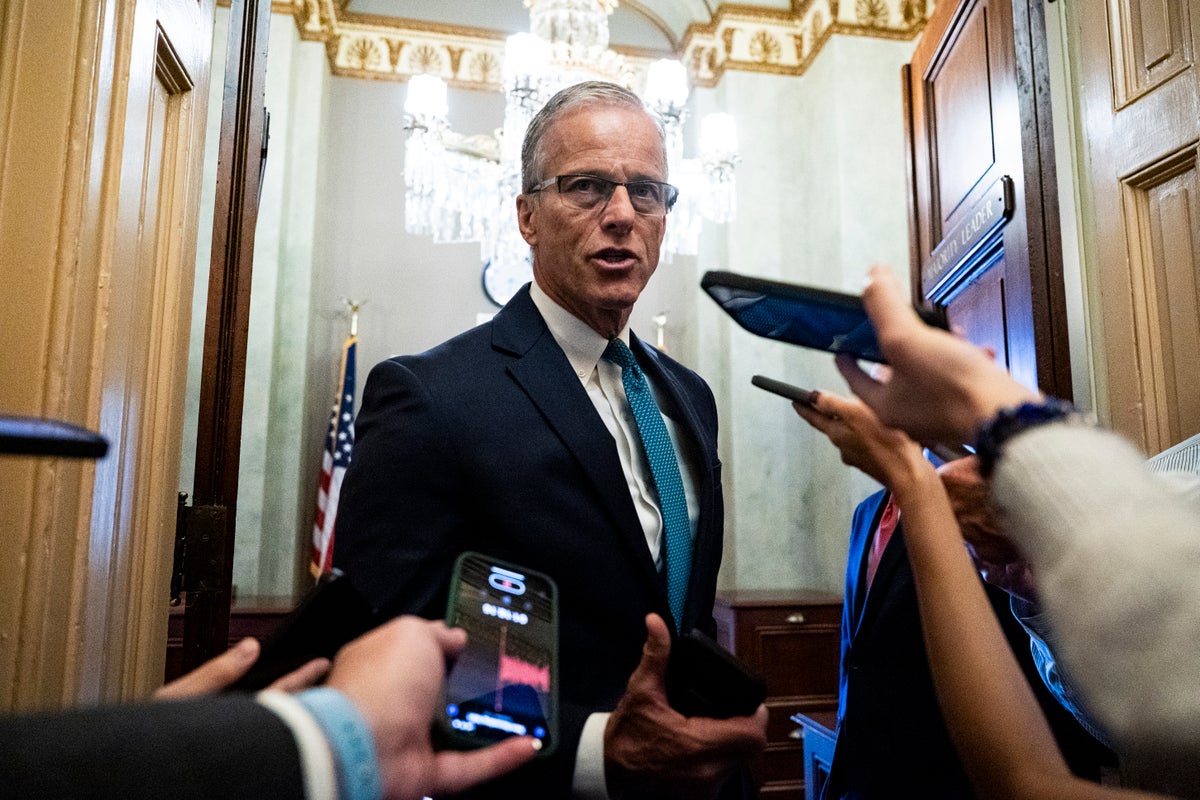
President Donald J. Trump secured a historic legislative victory Tuesday afternoon as the Senate narrowly passed the One Big, Beautiful Bill Act—his sweeping tax and spending reform package—following a grueling 27-hour session and intense, high-stakes negotiations that gripped Washington through the night.
With the vote tied 50–50, Vice President J.D. Vance cast the decisive tiebreaker, delivering Trump the win he demanded before July 4 and solidifying the GOP’s agenda heading into the second half of 2025.
The razor-thin margin highlights not just the urgency but also the resolve of Republican leadership to shepherd through one of the most ambitious fiscal restructuring packages in modern history.
Senate Majority Leader John Thune (R-S.D.) and Finance Committee Chair Mike Crapo (R-Idaho) navigated a minefield of intraparty opposition, Democrat procedural sabotage, and complex budget rules to get the bill across the finish line.
The legislation, praised by Trump as a “once-in-a-generation correction to bloated, broken government,” is designed to permanently extend the 2017 Tax Cuts and Jobs Act, deliver landmark tax relief to working-class Americans, secure the nation’s border, and reduce government dependency through reform of Medicaid and food assistance programs.
“This is what winning for the American people looks like,” Vice President Vance said after casting the historic tiebreaker. “We made good on our promises, we fought for the forgotten men and women, and we passed the bill that will define this administration’s legacy of growth, reform, and American greatness.”

In the end, the decisive moment came down to Sen. Lisa Murkowski (R-Alaska), a centrist voice in the chamber whose concerns about rural Medicaid and food assistance cuts nearly derailed the package.
Republican leaders worked around the clock to win her over, offering a modified version of Medicaid provisions and doubling a key rural hospital relief fund from $25 billion to $50 billion.
Murkowski, who had been visibly torn, eventually sided with the package despite her deep reservations. “It was agonizing,” she said. “But I believe in protecting tax relief for families and small businesses. That is what finally tipped the scales for me.”
Her decision came after dozens of rejected proposals and interventions from Senate Parliamentarian Elizabeth MacDonough, who repeatedly struck down state-specific carve-outs that violated the Byrd Rule governing budget reconciliation.
To get the changes past the parliamentarian, Republican negotiators broadened the SNAP waiver provision from just Alaska and Hawaii to around ten states with high error rates in food benefit distribution.
The compromise allowed the chamber to preserve procedural legitimacy while still addressing some of Murkowski’s core concerns.

The bill marks a monumental win for Majority Leader Thune in his first year leading Senate Republicans. Faced with unrelenting pressure from Democrats and wavering GOP colleagues, Thune and his whip team executed a flawless endgame strategy in the final hours, lobbying lawmakers, managing floor amendments, and balancing ideological and regional interests to keep the coalition intact.
“This legislation protects our economic future, our national defense, and our working families,” Thune said Tuesday. “And it ensures that the American Dream isn’t smothered by inflation, taxation, and a federal bureaucracy that has run wild for far too long.”
Thune was joined by Sen. John Barrasso (R-Wyo.), who reportedly stayed by Murkowski’s side for nearly nine hours leading into the final vote. The GOP leadership’s relentless ground game was a key factor in flipping a vote that had seemed doomed just 24 hours earlier.
The One Big, Beautiful Bill Act is a multifaceted conservative legislative juggernaut, combining fiscal reform, tax relief, and structural realignment of government spending.
It includes:
-
A full extension of the 2017 Trump tax cuts, preventing a $2.6 trillion tax hike on families earning under $400,000.
-
Permanent corporate tax rate reductions to maintain America’s global competitiveness.
-
New tax benefits for hourly workers, including exemptions for tips and overtime pay.
-
A $160 billion infusion for border security and immigration enforcement.
-
$150 billion in new funding for the Department of Defense.
-
A $5 trillion raise in the debt ceiling, accompanied by over $900 billion in Medicaid restructuring.
-
The introduction of “Trump Savings Accounts” for all American children under 18.
-
Deductible interest for loans used to buy American-made cars.
-
A phase-out of renewable energy tax credits, effectively rolling back the core of the Biden-era Inflation Reduction Act.
The legislation also eliminates redundant federal agencies, empowers the Department of Government Efficiency (DOGE) to streamline oversight, and locks in structural changes to entitlements to protect long-term solvency.

Senate Democrats, led by Sen. Chuck Schumer (D-N.Y.), fought the bill at every stage. They forced a 16-hour reading of the legislation over the weekend and mounted over 100 amendments, most of which were rejected. Schumer decried the bill as “a betrayal of the working class,” citing the reductions to Medicaid and SNAP benefits.
“This is nothing more than a giveaway to billionaires while working families suffer,” Schumer said. “We will fight this bill in every corner of America over the next 16 months.”
But the Democrats’ opposition ultimately lacked the votes to block reconciliation, and the GOP prevailed with zero support from across the aisle.
The legislation now heads to the House, where Speaker Mike Johnson (R-La.) will have to navigate objections from a handful of fiscal hawks. Already, Rep. Thomas Massie (R-Ky.) has signaled likely opposition due to the bill’s overall debt impact.
Still, the momentum from the Senate victory—and the growing alignment between the White House and House GOP leadership—is expected to smooth the path forward.
Johnson has already begun calls with concerned members to ensure their support, focusing on the strategic importance of passing the bill before the holiday recess.
“This is the president’s signature bill. This is the conservative movement’s mandate. And we’re going to finish the job,” Johnson said in a brief statement.

For President Trump, the Senate passage is a triumphant reaffirmation of his governing philosophy: economic nationalism, tax relief, border security, and aggressive administrative streamlining. It also represents a defining moment of strength heading into the latter half of his second term.
The bill, if signed into law as expected, will reshape the fiscal landscape of the United States for the next decade. Trump has signaled that he plans a national campaign to promote the legislation, highlighting individual components at rallies and through social media to generate grassroots awareness and energy.
White House officials celebrated the victory as a mandate for Trump-style governance. “No other president in history has dared to move this boldly,” said a senior official. “This is not about politics. It’s about restoring the soul of a nation that works, that builds, and that protects its own people.”
While the road to this moment was anything but easy, the Republican-led Senate has now accomplished what many deemed impossible just a month ago.
With the One Big, Beautiful Bill Act poised to become law, the Republican Party has delivered on promises made, solidified its identity around conservative reform, and handed President Trump the legislative muscle he needs to reshape the American economy for a new generation.

From tax relief to national security, from entitlements to deregulation, the bill stands as a monumental expression of what conservative governance can achieve when unified behind a bold, unapologetic vision. For Trump supporters and Republican loyalists, this is more than just a bill—it is a battle cry of American renewal.



